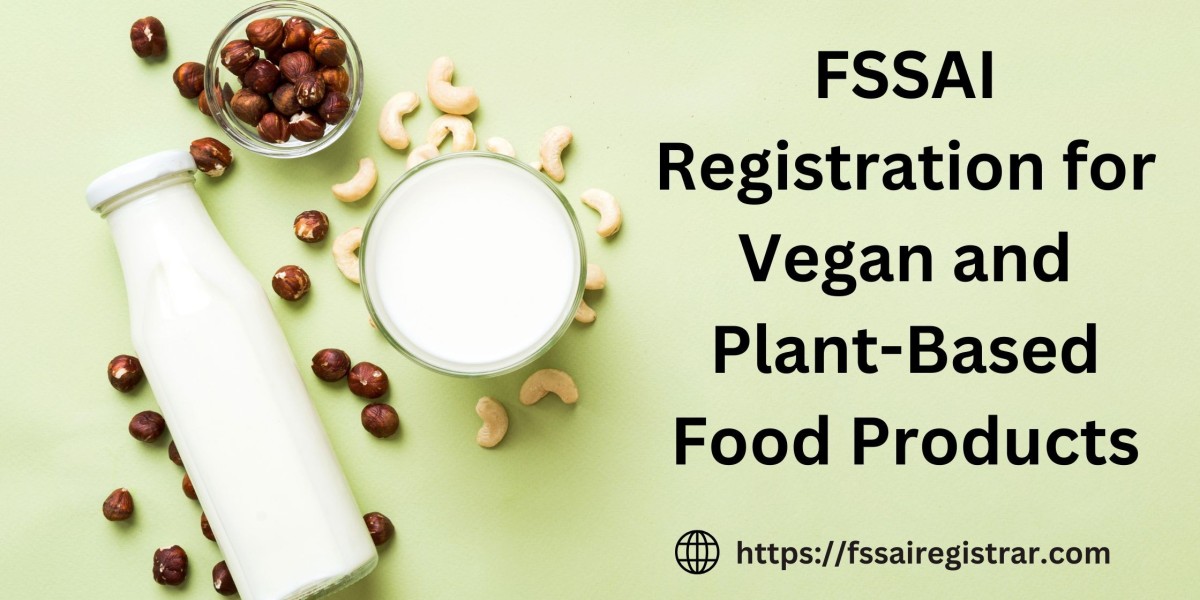The demand for vegan and plant-based food products has been growing rapidly in India. More people are adopting a plant-based lifestyle, either for health benefits, ethical reasons, or environmental concerns. With this shift in consumer preferences, businesses producing and selling vegan and plant-based food must ensure their products meet food safety and quality standards. This is where FSSAI registration comes in. The Food Safety and Standards Authority of India (FSSAI) ensures that food products sold in the market are safe for consumption and meet the required hygiene and quality standards. If you own a vegan food business, FSSAI registration is not just a legal requirement—it also builds customer trust and enhances your credibility.
Let’s dive into why FSSAI registration is important for vegan and plant-based food businesses, how to get registered, and the benefits it brings.
Why is FSSAI Registration Important for Vegan and Plant-Based Food?
Legal Requirement
FSSAI registration is mandatory for all food businesses in India, including vegan and plant-based brands. Whether you run a small homemade vegan food business, a plant-based restaurant, or a large-scale vegan food manufacturing company, you need FSSAI registration or a license, depending on your business size and operations.
Ensures Food Safety and Hygiene
Consumers trust food products that are certified by FSSAI because they meet the required safety and hygiene standards. FSSAI ensures that plant-based and vegan foods are free from harmful substances, properly processed, and labeled correctly.
Transparency and Consumer Trust
With an increase in fake vegan products and misleading claims, consumers are becoming more cautious about what they buy. Having an FSSAI-registered vegan food business assures customers that your products are genuinely safe and plant-based.
Labeling and Certification
FSSAI has introduced specific guidelines for vegan food labeling. If your products are purely plant-based, you must ensure they do not contain any animal-derived ingredients, including dairy, honey, or gelatin. Proper labeling is required to comply with FSSAI rules.
Business Expansion and Market Recognition
With an FSSAI license, your business can sell products in retail stores, and online platforms, and even export to international markets. It also makes it easier to collaborate with supermarkets, restaurants, and cafes that require certified products.
Types of FSSAI Registration for Vegan Food Businesses
FSSAI registration depends on the size and scale of your business. There are three types:
- Basic FSSAI Registration
- For small enterprises whose yearly revenue amounts to no more than ₹12 lakh
- Suitable for home-based vegan food businesses, small cafes, and startups
- State FSSAI License
- For companies whose yearly revenue is between ₹12 lakh and ₹20 crore
- Required for medium-scale manufacturers, restaurant chains, and food processing units
- Central FSSAI License
- For large-scale businesses with a turnover of above ₹20 crore
- Needed if your business operates in multiple states or exports vegan food products
How to Apply for FSSAI Registration for Vegan Food?
- Submit the Application: Fill out the application form accurately and submit it along with the required documents through the FSSAI portal. Pay the online fees for your application for FSSAI registration.
- Verification: The concerned representative will verify your FSSAI Registration Application.
- Inspection: Upon submission, FSSAI officials may inspect your facility to ensure compliance with safety and hygiene standards.
- Receive Registration Certificate: If your application is approved, you will receive your FSSAI registration certificate. This document serves as proof that your business is compliant with food safety regulations.
Benefits of FSSAI Registration for Vegan Food Businesses
Increased Customer Trust
Consumers prefer certified vegan food brands because they ensure safety, transparency, and authenticity.
Legal Protection
Running a food business without FSSAI registration is illegal and can result in penalties, fines, or business shutdown.
Competitive Advantage
Many retailers, supermarkets, and online food platforms require FSSAI certification before listing products.
Export Opportunities
An FSSAI license allows businesses to export vegan products to international markets, helping expand brand reach.
Better Business Growth
Having FSSAI registration makes it easier to attract investors, partners, and distributors, allowing the business to scale effectively.
FSSAI Guidelines for Vegan Food Labeling
In June 2022, FSSAI introduced official guidelines for vegan food labeling to prevent misleading claims and cross-contamination. Here’s what businesses need to follow:
- Only 100 percent plant-based ingredients must be used. No traces of animal-derived substances.
- Vegan products must have a green logo with a "V" symbol (introduced by FSSAI).
- No cross-contamination with non-vegan products during processing, packaging, or transportation.
- Labels must mention all ingredients clearly, along with nutritional information.
Note: Apply for Tatkal FSSAI Registration through our website
Conclusion
As the demand for vegan and plant-based food grows, FSSAI registration is essential for businesses to gain trust, ensure compliance, and expand their market reach. Whether you are a home-based vegan food seller, restaurant owner, or manufacturer, getting an FSSAI license is a smart investment in your business’s future. By ensuring food safety, proper labeling, and legal compliance, FSSAI registration helps strengthen your brand and attract more customers. If you are running a vegan food business, do not wait—register with FSSAI today and secure your place in the growing plant-based industry.



